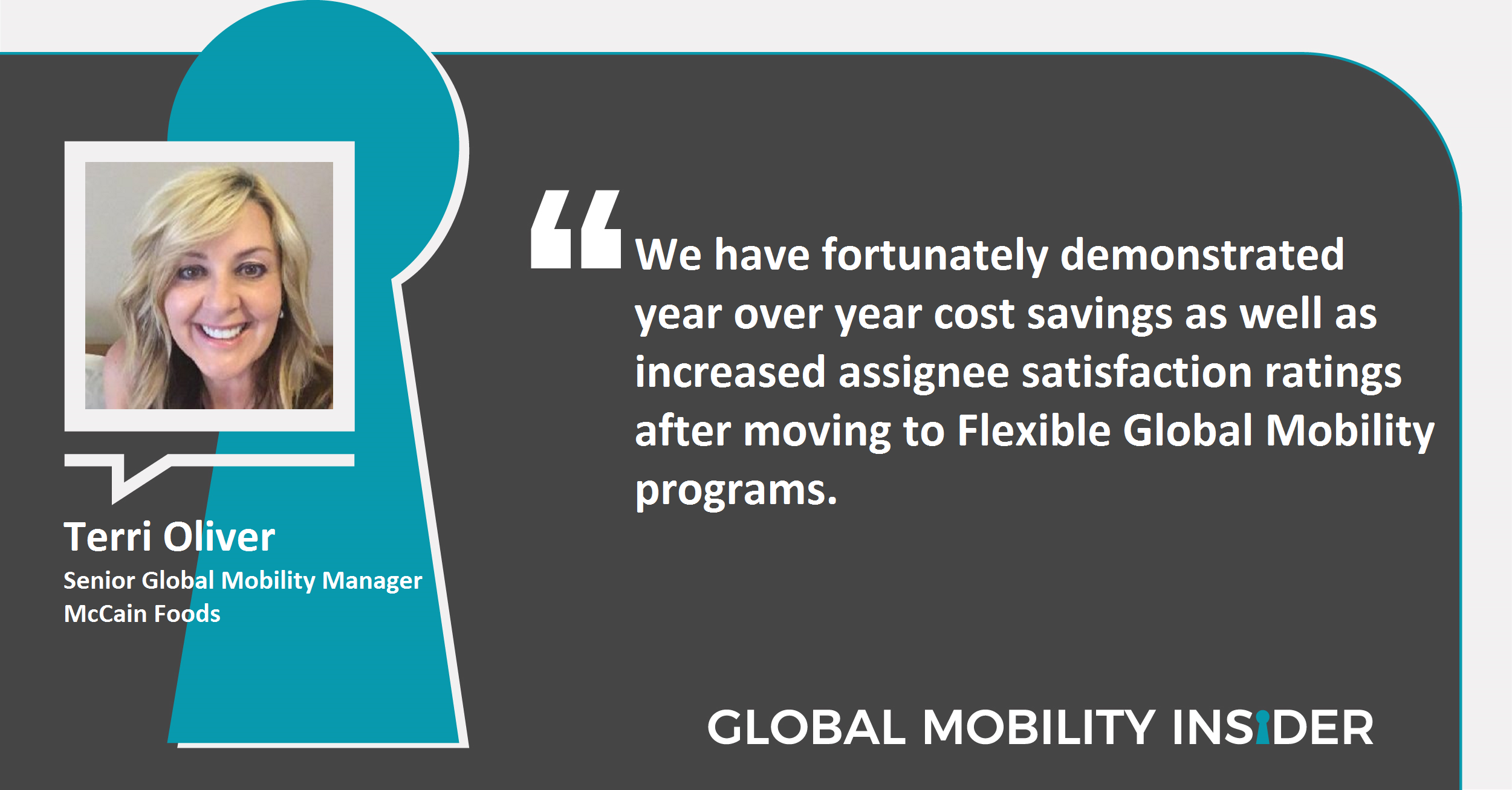Terri Oliver – Senior Global Mobility Manager - McCain Foods
Name: Terri Oliver
Job: Senior Manager, Global Mobility
Company: McCain Foods

Professional Background
Prudential Relocation, Relocation Manager: 1993-2003
Siemens, Global Mobility and Human Resources Manager: 2003-2005
Weichert Relocation Resources, Director, Client Services: 2005-2008
TheMIGroup, Director, Consulting Services: 2008-2011
Manulife Financial, Director, Global Mobility & Global Rewards: 2011-2013
KPMG Management Services LP, Talent Attraction Leader, Talent Mobility: 2014
McCain Foods, Senior Manager, Global Mobility: 2014-Present
Career Insider
Q: Can you tell us more about your background and your role in McCain Foods Ltd.?
I am fortunate to have been in the global mobility industry for more than 23 years and have witness the evolution of the Global Mobility function within an organisation. I am also privileged to have worked for both multi-national corporations, including KPMG, Manulife, Siemens and Nortel Networks, in addition to global mobility service providers; this diverse experience is valuable to best understand the complexity and the requirements of a relocation or international expatriate assignment.
The original function of a mobility practitioner was primarily administrative and involved the coordination of services required to move an employee/client from point A to point B. This is in contrast to my current role at McCain Foods Limited where I am involved in the process from start to end, beginning with Talent discussions through to succession planning and repatriation programs.
My current role would be comparable to a “consultant” whereby I assess the assignment specifics, such as the employee type (High Potentials, Critical Skills, Key Talent, etc.); their family situation and requirements; housing in home and host countries; the country combinations and income tax and immigration implications; duration of the assignment; succession/career plans after the assignment; specifics related to compensation structures to determine whether they should be paid in the home or host country; pension implications; and, cost of living and goods and service differentials between the home and host countries. All of these factors are essential to provide a recommendation for the assignment structure (home-based, host-based, local, local plus) that best meets all the above specific requirements, and to provide a cost projection to the business.
Global Mobility is invited to discussions concerning our talent, global opportunities and succession planning for High Potentials and Key Players in our organisation. We frequently review our talent and expatriate population along with open opportunities; with this perspective, I am able to align my policies and programs to meet the specific needs of our talent, address country and compliance requirements, while maximising the cost effectiveness of our programs. One year ago I implemented Flexible Global Mobility programs which have met these objectives.
In addition to talent, policy and administration, maintaining global immigration and income tax compliance is a crucial component of my role at McCain Foods. With immigration and tax laws being modified somewhere in the world almost on a daily basis, keeping on top of “the rules” to ensure our employees remain compliant while conducting business on behalf of McCain Foods is essential.
Click & Like on LinkedIn
Q: What advice would you give to someone looking to build a career in HR and global mobility?
I am always astounded at how much our industry changes, and it is this change and our ability to adapt, which makes a career in Global Mobility fascinating. The expertise that we are able to gain through our experiences is also extremely unique and diverse. Out of necessity, we become subject matter experts in immigration and income tax compliance, global benefits, global pension plans and country requirements, compensation plans, talent strategy, housing and home sale programs, international shipping requirements, reporting and financial requirements, budgeting and customer service. Fortunately, due to the importance and risk related to non-compliance, this expertise is valued by organisations.
Industry Insider
Q: What kind of difficulties do you face when handling tax compliance for global assignments?
A solid understanding of individual country tax legislation and tax treaties between countries is extremely important to assess the best assignment structure and to minimise costs. In addition, keeping track of our frequent business travellers is also essential to ensure both personal and corporate income tax compliance. Since requirements vary by country, being aware of country-specific tax laws are very important. Also, an understanding of corporate income tax implications, such as Permanent Establishment is imperative to ensure the correct processes and documentation is in place. Since there is a risk to the company’s reputation as well as the potential for financial penalties, compliance is definitely the ultimate goal.
Q: What are the trends that you see developing in the Global Mobility industry?
A trend in our industry is flexible policies. At McCain Foods, we have moved to entirely Flexible Global Mobility programs for both assignments and relocations, which are aligned to our Global Talent Strategy. The benefits that the employee receives are tied to employee needs, country combinations and compliance requirements, as well as the type and intention of the assignment, and any cost restraints. We have fortunately demonstrated a year over year cost savings as well as increased assignee satisfaction ratings after moving to this flexible model.
Another trend is that data and analytics are now an important part of our function; reporting on costs, cost savings, expatriate retention rates, ROI or diversity statistics are now important topics with our senior leaders.
Q: What kind of technology do you use to monitor the HR and global mobility activities in your company?
At McCain Foods, we do utilise the various technology platforms offered by our relocation service providers. In-house, I rely on an Access database to track the data and metrics that I am required to report to my management.
Either/or:
- Short-term assignment or Long-term assignment? – Both. As part of our Talent Mobility Strategy, we have both long and short term assignments. Short-term assignments are typically reserved for developmental purposes, while Long-term assignments would fill a strategic gap.
- Airbnb or Serviced Apartments? – Historically, serviced apartments are the norm, however, just last week McCain actually just implemented a corporate account with Airbnb, which is on a trial basis. Very excited to be able to offer this option.
- Excel or Global Mobility Software? – Access database for the historical tracking, and the always reliable, Excel for reporting.
- Lump Sum or Flex Ben? – Both. I implemented Flexible Mobility Programs for both relocation and expatriates; the benefits are determined via a needs assessment with the employee, and complies with any legislative/compliance requirements, and meets any financial restrictions of the department. There is a Managed Lump Sum provision, however, these are typically reserved for new hire domestic relocations only.
- Facebook or Linkedin? – Facebook for socialising and Linkedin for networking
- Outlook or Gmail? – Outlook for business, Gmail for personal.
- Taxi or Uber? – Uber
- iOS or Android? iOS
- Mac or PC? – I am definitely a Mac! Mac for personal, PC for work.
- Computer or tablet? – Both!
- Work hard or play hard? – My motto … Work hard, and play even harder!


Leave a Comment
* Fields marked with this asterisk are mandatory.